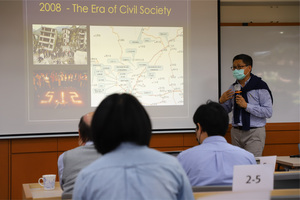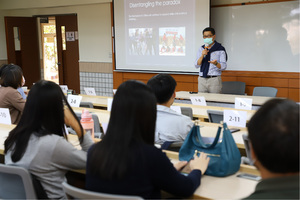:::
Master Talk: The Rise and Fall of Civil Society in China
Edge research
Poster:Ms. Ching-Yi Hsu ╱ Post date:2021-12-16 【Article by International College of Innovation】
On December 14th, 2021, visiting professor Kin-man Chan from the Department of Sociology, NCCU gave a speech on Civil Society in China. In particular, he focussed on paradoxes that surround the topic. Mainly, the professor emphasized on the domestic and foreign NGOs in China and the way they overcome obstacles imposed by the central Chinese authorities.
In 1989, democratic movements witnessed a rosy bloom in China, where activist and civic groups advocated and promoted civic rights ruthless cracked down by the Chinese regime. And due to the harsh restrictions, most civil activites were cloched within grey zones in order to avoid the tragic fate of being prosecuted. When Xi Jinping came to power, civil activities all gound to a halt.. In October 2013, CCP publicly stressed the need to regulate foreign NGOs and their activities in China. In this regard, The National People’s Congress Standing Committee adopted the Law of the People’s Republic of China on Administration of Activities of Overseas Nongovernmental Organizations in the Mainland of China on April 28, 2016. The law stated that CCP views foreign NGOs and civil society as a security threat. Since then, all NGOs were obliged to be registered with the Ministry of Public Security (MPS), if they intend to keep operating within Mainland China. Eventually, this led to the reduced influence from overseas on Chinese society and cut civil society international linkages. Moreover, it led to government crashes on activists, especially in Hong Kong.
In 2013 Prof. Chan, a former faculty member from the sociology department at the Chinese University of Hong Kong, initiated the civil disobedience campaign “Occupy Central with Love and Peace” which later led to the globally-known Umbrella Movement in 2014. His December 14th lecture raised many interesting questions among NCCU students and elightened us all with all the crucial findings that trufully reflect the dire situtations of China's civial societies overshawed by the supressions and coercisions. . After the speech in a private talk, Prof Chan shared that he is about to publish his book about his life experience that will help to shed light on some interesting aspects of Chinese Civic Society.


Master talk: The Rise and Fall of Civil Society Master talk: The Rise and Fall of Civil Society
in China.(Photo Source: International College in China.(Photo Source: International College
of Innovation) of Innovation)
On December 14th, 2021, visiting professor Kin-man Chan from the Department of Sociology, NCCU gave a speech on Civil Society in China. In particular, he focussed on paradoxes that surround the topic. Mainly, the professor emphasized on the domestic and foreign NGOs in China and the way they overcome obstacles imposed by the central Chinese authorities.
In 1989, democratic movements witnessed a rosy bloom in China, where activist and civic groups advocated and promoted civic rights ruthless cracked down by the Chinese regime. And due to the harsh restrictions, most civil activites were cloched within grey zones in order to avoid the tragic fate of being prosecuted. When Xi Jinping came to power, civil activities all gound to a halt.. In October 2013, CCP publicly stressed the need to regulate foreign NGOs and their activities in China. In this regard, The National People’s Congress Standing Committee adopted the Law of the People’s Republic of China on Administration of Activities of Overseas Nongovernmental Organizations in the Mainland of China on April 28, 2016. The law stated that CCP views foreign NGOs and civil society as a security threat. Since then, all NGOs were obliged to be registered with the Ministry of Public Security (MPS), if they intend to keep operating within Mainland China. Eventually, this led to the reduced influence from overseas on Chinese society and cut civil society international linkages. Moreover, it led to government crashes on activists, especially in Hong Kong.
In 2013 Prof. Chan, a former faculty member from the sociology department at the Chinese University of Hong Kong, initiated the civil disobedience campaign “Occupy Central with Love and Peace” which later led to the globally-known Umbrella Movement in 2014. His December 14th lecture raised many interesting questions among NCCU students and elightened us all with all the crucial findings that trufully reflect the dire situtations of China's civial societies overshawed by the supressions and coercisions. . After the speech in a private talk, Prof Chan shared that he is about to publish his book about his life experience that will help to shed light on some interesting aspects of Chinese Civic Society.


Master talk: The Rise and Fall of Civil Society Master talk: The Rise and Fall of Civil Society
in China.(Photo Source: International College in China.(Photo Source: International College
of Innovation) of Innovation)
Reference link:https://www.nccu.edu.tw/p/405-1000-10735,c87.php?Lang=en
Last modification time:2021-12-20 PM 1:41








